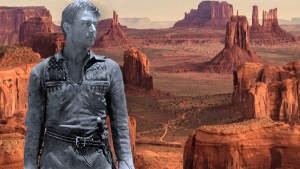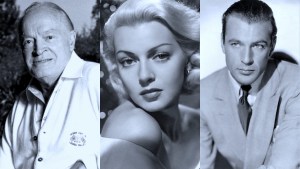Many of Hollywood’s great classic directors had one thing in common: the Catholic faith that formed them in the heart of Christ.
Filmmakers like Alfred Hitchcock, Frank Capra, Leo McCarey, and John Ford were infused from the cradle with the ideal that Christ taught and lived — to live for something greater than oneself, for love.
That something greater for Ford was expressed in a career packed with great films steeped in Catholic sensibilities. They portray life not as “senseless wandering, but [a] pilgrimage leading to some sort of decreed epiphany [in which] the characters find redemption,” as Ford film scholar Tad Gallagher observed. In this, John Ford’s filmography is a mirror of the need we all have for the redemption that Jesus won for us on the cross.
Then, too, there is a palpable sense of community in Ford’s films, starting with the community of family. It was the societal building block that Ford soaked in from the time he opened his eyes onto the world of immigrant-rich Cape Elizabeth, Maine, on February 1, 1894.

A career of excellence
Christened John Martin “Jack” Feeney, he was the 10th of 11 children born to John Augustine Feeney and Barbara “Abbey” Curran. They were staunch Irish Catholic immigrants from, respectively, County Galway and the Island of Inishmore. John Feeney, Sr. arrived in Boston in May 1872, followed a month later by his bride-to-be in Portland, where they tied the knot on July 31, 1875.
After high school, John followed his older brother, “Frank Ford,” to Hollywood, the new filmmaking capital, and began learning the art of filmmaking. By 1917, “John Ford,” 23, was behind the camera directing, making over 130 films, until he said “cut” for the last time in 1966. In that career, he won a record four “Best Director” Oscars for The Informer (1935); The Grapes of Wrath (1940); How Green Was My Valley (1941); and The Quiet Man (1952).
Then there were classics like Stage Coach (1939), his first teaming with life-long friend and drinking buddy, “intellectually Catholic” and later convert, John “Duke” Wayne; My Darling Clementine (1946); Fort Apache (1948); The Searchers (1956); and The Man Who Shot Liberty Valance (1962). Even Ford’s lesser-known films like Three Godfathers (1948) are worth watching. That one is about three bank robbers who become doting godfathers. Redemption writ large.
During World War II, Ford fought America’s fascist enemies with nitrate celluloid film. Assigned as a Naval Reserve officer by OSS head “Wild Bill” Donovan, Ford directed a number of documentaries, including the classics Battle of Midway and December 7, in support of the war effort.

“Simple faith in Jesus Christ”
Ford once said in an interview with writer-director Peter Bogdanovich that he was not “very Catholic” in practice. It should be noted, however, that Ford liked to assume a tough guy image, playing down the poetic and deeply sentimental aspects of his nature. Those are evident in his films, as are his religious yearnings.
It is telling, for instance, that the first film that John Ford made as an independent producer was The Fugitive, based on Graham Greene’s The Power and the Glory. That novel is about a priest being hunted by anti-Catholic fanatics in Mexico. Most critics lambasted the film, which failed at the box office, but Ford remained proud of it.
Certainly Ford’s marriage to Mary McBryde Smith Ford, a non-Catholic divorcee, created certain obstacles to the practice of his faith. Yet his grandson and biographer Dan Ford insists that “simple faith in Jesus Christ was a comfort to him in his last days.”
John Ford’s Catholicism was epitomized by such gestures as giving a rosary to an atheist interviewer in the 60s and providing a chapel and farm as a memorial to members of his unit who had died in the war, as a place where war veterans could come with their families. The farm was later sold, and Ford donated the proceeds to the Motion Picture Home in Woodland Hills for financially needy retired actors. “The John Ford Chapel” was subsequently moved there.

‘The Searchers’ and searching for purpose
At their recent film fest, Turner Classic Movies (TCM) premiered The Searchers (1956), beautifully restored courtesy of TCM and the Film Foundation. This Ford masterpiece, set in Monument Valley, is indelibly imprinted with Ford’s secret formula of community: a purpose larger than oneself, pilgrimage, and forgiveness. The heart of Christ!
TCM has devoted Season 5 of their podcast The Plot Thickens to John Ford, which, fittingly premieres on June 6, the 80th anniversary of D-Day. The channel will also re-air his films during June, which is also the month devoted to the Sacred Heart of Jesus.
For his efforts, besides his record Oscar wins (besting Capra by one), Ford was honored with the American Film Institute’s Life Achievement Award on March 31, 1973. That same night President Richard Nixon presented him with the Presidential Medal of Freedom.
After Nixon spoke, Ford recounted a recent telephone conversation with the president, who wanted to know his reaction to POWs coming home. “I said, ‘Frankly, sir, I broke down and blubbered and cried like a baby. Then I reached for my rosary and said a few decades of the beads…’”
John Ford died on August 31, 1973. His purpose fulfilled, redemption at hand, he was buried at Holy Cross Cemetery in Culver City.



